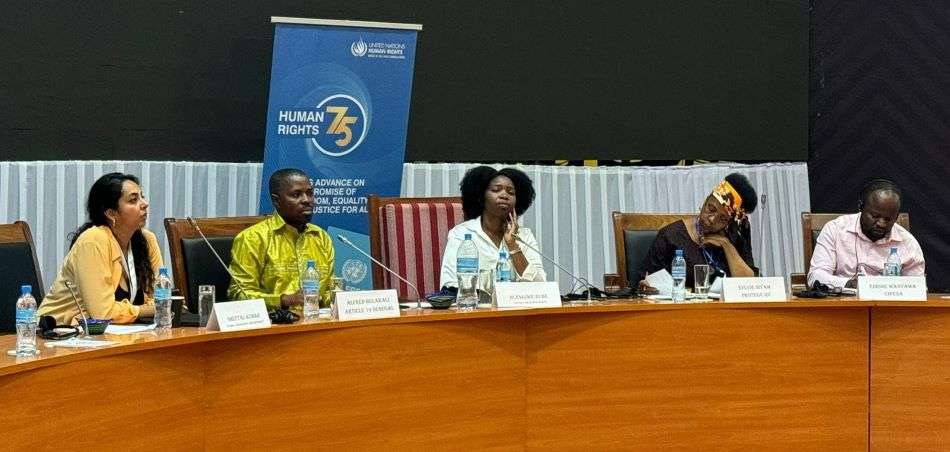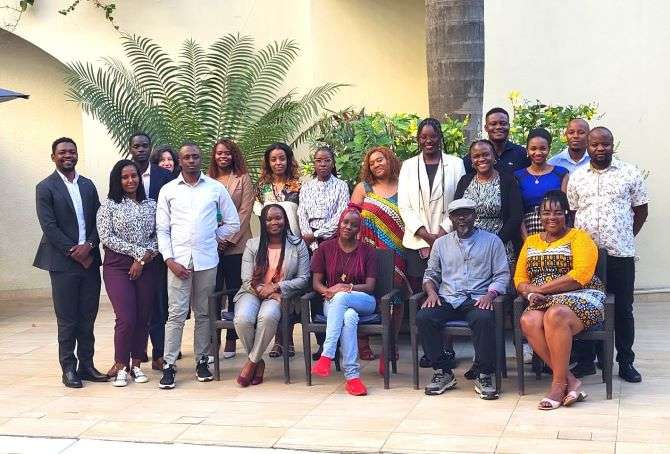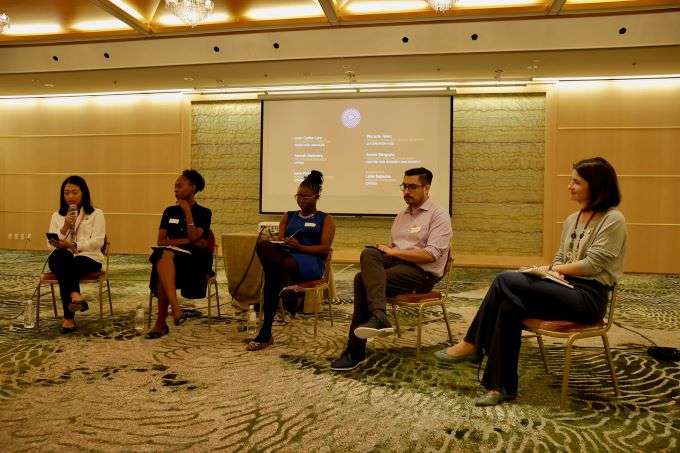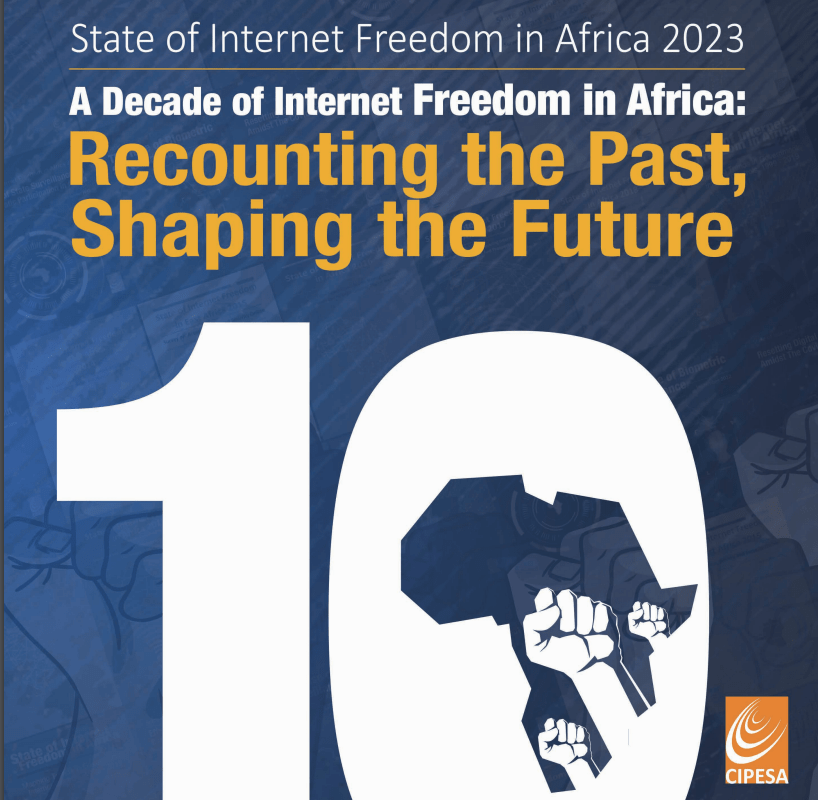By CIPESA Writer |
The effects of disinformation on the digital civic space have been put in the spotlight at the 77th Ordinary session of the African Commission on Human and Peoples Rights held in Arusha, Tanzania on October 16-18, 2023.
In a panel session titled “Promoting rights-respecting government responses to disinformation in Sub-Saharan Africa,” speakers explored how disinformation affects online rights and freedoms including freedom of expression, access to information, freedom of assembly and association and participation especially in electoral democracy. Speakers at the session, which was part of the Non-Government Organisations (NGOs) Forum, were drawn from Global Partners Digital, the Collaboration on International ICT Policy for East and Southern Africa (CIPESA), ARTICLE 19 Senegal/West Africa, PROTEGE QV of Cameroon, and the Centre for Human Rights at the University of Pretoria.
Hlengiwe Dube of the Centre for Human Rights explored the general terrain of disinformation in Africa, including the steadily evolving information disorder. She also highlighted the LEXOTA disinformation tracker created by a project led by Global Partners Digital with several African partners, which was intended to ensure that limitations and controls on freedom of expression and access to information, as well as assembly and association, are minimised.
Sheetal Kumar, the Head of Engagement and Advocacy at Global Partners Digital, said the tracker is an essential tool for exploring how laws and government actions against disinformation impact freedom of expression across Sub-Saharan Africa. The tracker is an interactive platform that allows for real time checking and comparison of laws and actions taken in 44 out of 55 African countries in response to disinformation. It provides a reference point for developments and trends.
Edrine Wanyama, a Legal Officer at CIPESA, observed that disinformation has been widely employed by governments in Burkina Faso, Cameroon, Ethiopia, Kenya, Nigeria, South Africa, Tanzania, Uganda as a excuse to enact laws and adopt regulations and policies that to curtail the digital civic space. As a result, access to the internet, access to information, freedom of expression, assembly and association and citizen participation in electoral democracy have been widely limited. Wanyama said that, as noted in the CIPESA research on Disinformation Pathways and Effects: Case Studies from Five African Countries, internet shutdowns during elections such as in Tanzania and Uganda were partly justified as a measure against disinformation, but led to questions about the credibility of the elections.
While discussing the advocacy initiatives undertaken by the project, Sylvie Siyam, director at Protege QV, noted that during the Covid-19 pandemic, some governments introduced measures to combat disinformation which contravene regional and international human rights standards. She said some of those measures remain in place and continue to be used to curtail freedom of expression, access to information, assembly and association.
She called for multi-stakeholder engagement especially involving CSOs, parliaments, and relevant government entities to pursue progressive policy reforms such as was witnessed by the adoption of the access to information law in Zimbabwe.
Most of the strategies employed by states to combat disinformation largely interfere with civil liberties. Laws and policies are often utilised to limit the space within which key players such as law dons, political dissidents, human rights defenders, journalists and online activists operate. The pinch has been widely felt through increased arrests, denial of fair trial rights, denial of participation in electoral democracy, censorship of the press, curtailment of freedom of expression and access to information and limiting enjoyment of economic freedoms.
Alfred Bulakali, Deputy Regional Director of ARTICLE 19 Senegal/West Africa, observed that disinformation endangers civic space given the regressive measures that states often take, such as the enactment and adoption of retrogressive legislation. He called on states to use human rights-based approaches when responding to disinformation as a means to safeguarding civil liberties. Bulakali also stressed the need for capacity building of CSOs to effectively challenge regressive and draconian laws.
The five partners provided the following joint recommendations for inclusion in the NGOs Statement to the African Commission on Human and Peoples’ Rights (ACHPR) 77th Ordinary Session.
Recommendations for States:
- Review and revise disinformation laws to align with international and regional human rights law and standards, eliminating general prohibitions on vague and ambiguous information dissemination. Ensure they have a narrow scope, adequate safeguards, and cannot be weaponised against journalists and human rights defenders. Review punitive measures, repeal laws criminalising sedition and defamation in favour of civil sanctions, and ensure compliance with international human rights laws.
- Develop and implement laws that combat disinformation openly, inclusively, and transparently, consulting with stakeholders. Train relevant authorities on regulations without infringing human rights, clearly communicate penalties, and build safeguards against misuse.
- Build the capacity of relevant actors to address disinformation in compliance with international standards. This includes addressing disinformation with multi-stakeholder and multi-disciplinary solutions, including media literacy training, empowering fact-checkers, journalists, legislators, and regulators, taking into account vulnerable and marginalised groups, in compliance with international standards.
- Conduct awareness-raising programmes on the information disorder.
- Desist from resorting to disproportionate measures that violate human rights like internet shutdowns or website blockages in response to disinformation.
- Enact and enforce access to information laws with proactive disclosure of credible and accurate information.
- Create a conducive environment that promotes healthy information ecosystems and ensures that citizens have access to diverse, reliable information sources, either proactively or upon request, in line with international human rights standards on access to information.
- Fully enforce decisions and frameworks on decriminalisation of defamation and press libel, restrain from using specific laws to repress speech and media for information disclosure under vague disposals relating to false news.
- Integrate Information and Media Literacy into the curricula of journalism training centres and schools.
- Train law enforcement actors on public information disclosure, the protection of freedom of expression in their approach to tackling disinformation and the prevention of public and political propaganda and information manipulation.
Recommendations for Civil Society Organisations:
- Monitor, document, and raise awareness of illegitimate detentions or imprisonments related to disinformation charges.
- Strengthen the advocacy and capacity building initiatives that support legal reforms for human rights legislations and policies tackling disinformation.
- Include digital and media literacy in advocacy initiatives.
Recommendations for Regional and International Bodies:
- Issue clear guidance on how states should develop and enforce disinformation legislation in a rights-respecting manner, including through open, inclusive, and transparent policy processes and multi-stakeholder consultations.
- Denounce the use of disinformation laws for political purposes or to restrict the work of journalists and legitimate actors.
- Integrate information disorder as a priority in human rights, rule of law, democracy and governance frameworks under development cooperation (bilateral and multilateral cooperation) and access to information as a tool to achieve accountability on public governance and the Sustainable Development Agenda.
Additional Recommendations to the African Commission Special Rapporteur on Freedom of Expression and Access to Information and other African Commission Special Mechanisms:
- Collaborate with stakeholders to address the information disorder in Africa.
- Promote the 2019 Declaration of Principles on Freedom of Expression and Access to Information in Africa for addressing the information disorder.
- Continuously monitor and document disinformation trends and expand the normative framework to combat disinformation.
- Organise country visits in member countries where disinformation laws and press libels are used to restrict speech and citizen engagement.





